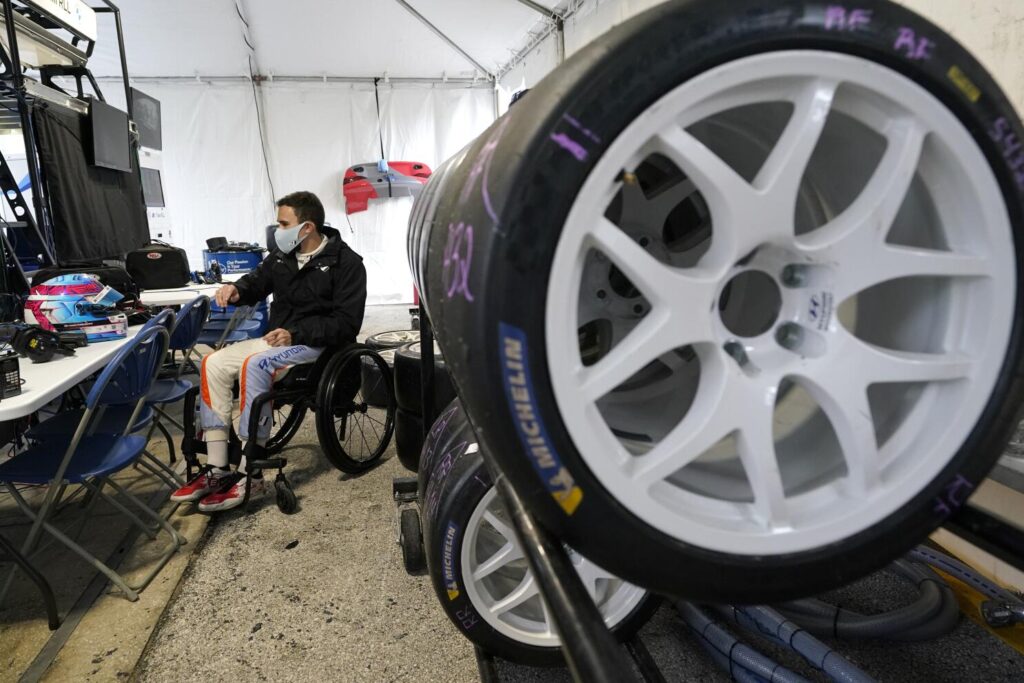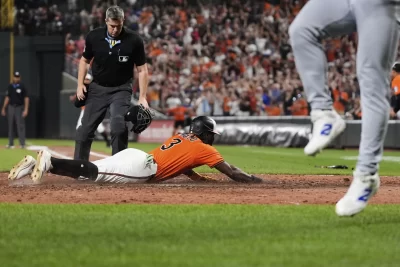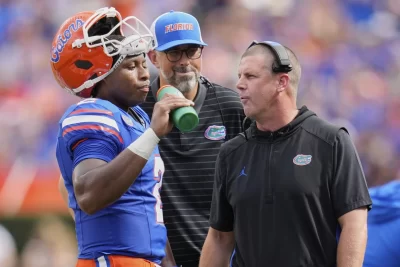
FILE - Robert Wickens in his pit stall, prepares to go out on the track during practice for the Rolex 24 hour auto race at Daytona International Speedway, Thursday, Jan. 27, 2022, in Daytona Beach, Fla. Wickens is the championship leader headed into Friday's Michelin Pilot Challenge season finale at Road Atlanta in Braselton, Georgia. (AP Photo/John Raoux, File)
Robert Wickens was determined from the very first days after his life-changing 2018 IndyCar accident not to let it define — or end — his racing career.
The Canadian was 29 years old at the time, engaged to be married, and a breakout rookie star in a United States-based racing series after a successful career in Europe. Wickens nearly won his IndyCar debut, scored four podiums, and was sixth in the championship race when he sailed into the fence at Pocono Raceway with three races remaining in the season.
He was paralyzed from the waist down.
Wickens moved to a rehabilitation facility in Colorado, at first as an in-patient, before he moved into an extended stay motel to continue the work. Six hours a day, six days a week.
“In the months and years that I spent rehabbing my body, trying to get the best quality of life possible for myself and for my family, always in the back of my mind I was wanting to return to racing,” Wickens told The Associated Press. “I wanted my own closure on my racing career. How it ended in Pocono in 2018 was not how I was going to end things.
Wickens was retained by his race team (he drove for Schmidt Peterson Motorsports, which is now Arrow McLaren) as a consultant but was still angling for ways to drive. He got his opportunity with Bryan Herta Autosport and Hyundai, which had experience in building and racing cars fitted with a hand control system to accommodate a paralyzed driver.
Just two seasons and 19 races into his comeback, Wickens heads into the Touring Car Class finale of the Michelin Pilot Challenge season as the championship leader. Wickens and co-driver Harry Gottsacker start Friday’s race at Road Atlanta for BHA in Braselton, Georgia, with a 20-point lead over JDC-Miller MotorSports.
Wickens and Gottsacker control their own destiny as they try to win Herta a fifth-consecutive TCR championship: finish higher than JDC-Miller, or, no lower than eighth overall in class, and they win the title.
It’s made Wickens even more determined to continue his comeback and remain a racecar driver.
Five years after the accident, Wickens knows he’ll never walk without assistance, which had been his initial goal.
“From a sensory standpoint, I can feel touch OK,” Wickens said. “Where I struggle is my legs are not equally strong. If I have assistance to get to a standing point, and if I have something to hold on to, I can stand up. But I can’t take three steps without holding onto something because I don’t have any core muscles. When I take a step, I can’t balance my upper body, so I basically just fall.”
He said he plateaued in neurological regeneration and hasn’t been able to activate any new muscles in nearly three years. Wickens works on strengthening the muscles he can voluntarily control, and just as important, his own mental health as he’s redefined what was a once perfect life.







